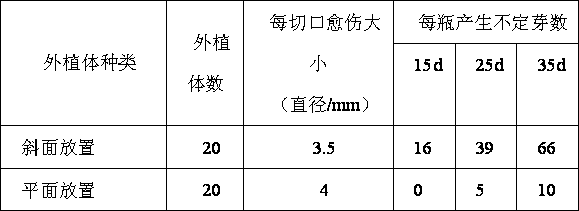Method for establishing in-vitro regeneration system of rachises of heuchera micrantha
An in vitro regeneration, inflorescence rachis technology, applied in the direction of plant regeneration, horticultural methods, botanical equipment and methods, etc., can solve the problems of difficulty in establishing sterile system, easy to form browning, and high pollution rate, and achieve a beneficial effect on microbial activity. , Improve the nutritional environment, the effect of good ventilation
- Summary
- Abstract
- Description
- Claims
- Application Information
AI Technical Summary
Problems solved by technology
Method used
Image
Examples
Embodiment 1
[0030] Explant Screening Example:
[0031] 1. Screening of the placement mode of explants in the culture medium
[0032] For the inflorescence axis of explants with similar size and growth state, the different placement methods also lead to different culture effects. The explants placed on an inclined plane germinated early, had a large number, and grew extremely fast, while the inflorescence axis placed on a flat surface had almost no bud point differentiation, and the explants placed more than 35 days tended to brown or dry up gradually.
[0033] Table 1
[0034]
[0035] 2. Examples of medium screening
[0036] During the establishment of the in vitro regeneration system of the callus pathway, the success of callus differentiation is the key step of the regeneration system. The rate of callus differentiation directly affects whether the regenerative tissue culture system is feasible. The combination of basic medium and hormone types and concentrations in the callus d...
Embodiment 2
[0040] 1. Selection and disinfection of explants: select the inflorescence rachis that has grown for about 20 days as the explants, wash them clean, and then disinfect them. The disinfection process is: rinse them with clean water, rinse them once with Amway detergent, and shake them on a shaker for 15 minutes. -20min; after rinsing with running water for 20-30min, disinfect with 75% ethanol for 10-20s on the aseptic operating table, immediately pour 0.1% mercuric chloride for disinfection for 12min, and finally wash 4 times with sterile water, shaking 3- After 5 minutes, the sterilized inflorescence rachis was cut into 2 cm long segments, and 50 inflorescence rachis segments were inserted in total.
[0041] 2. Induction of callus: take the explant fragments obtained in step (1), and inoculate them in the induction medium (invert the slant of the medium in advance) on a slant to induce callus. The culture temperature is 25±2°C, first cultured in the dark for 10 days, and then ...
PUM
 Login to View More
Login to View More Abstract
Description
Claims
Application Information
 Login to View More
Login to View More - R&D
- Intellectual Property
- Life Sciences
- Materials
- Tech Scout
- Unparalleled Data Quality
- Higher Quality Content
- 60% Fewer Hallucinations
Browse by: Latest US Patents, China's latest patents, Technical Efficacy Thesaurus, Application Domain, Technology Topic, Popular Technical Reports.
© 2025 PatSnap. All rights reserved.Legal|Privacy policy|Modern Slavery Act Transparency Statement|Sitemap|About US| Contact US: help@patsnap.com

